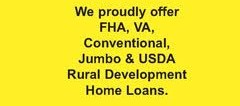When it comes to financing a home a buyer is faced with the decision of what type of loan they want. The two most common choices are FHA or Conventional. Both have their advantages and disadvantages. Follow the chart below to see which one is a fit for you!
For more information on homes available for FHA or Conventional
Which Loan is better for you?
Kentucky FHA Loans are good for borrowers who have the following:
• Credit scores less than 680.
• Less than 5% down payment and no reserves to use.
• Borrowers with past foreclosures between 3 and 7 years old.
• Borrowers with past short sales between 2 and 4 years old.
• Borrowers who need a gift for the down payment and/or closing costs, prepaid taxes and
insurance.
The FHA Mortgage Insurance premium is a premium that exists for the FHA Loan that is
paid up front and monthly by the homebuyer. This premium protects the lender should the
buyer default. They vary per state and per type of loan Kentucky home buyers qualify for. In Kentucky, upfront mortgage insurance premiums are 1.75%.
Below are the rates per type of loan:
• 15-Year Fixed with down payment more than 10%: .45%
• 15-Year Fixed with down payment less than 10%: .70%
• 30-Year Fixed with down payment more than 5%: .80%
• 30-Year Fixed with down payment less than 5%: .85%
Kentucky Conventional loans are usually reserved for the following:
• Credit scores greater than 680
• Greater than or equal to 5% down payment with reserves
• Borrowers with past foreclosures over 7 years old.
• Borrowers with past short sales between 5-7 years old.
• Borrowers who have a lot of money saved up and want to get rid of mortgage insurance within the first 5 years give or take. 20% equity position is needed for no mi
The biggest difference between conventional loans and FHA loans comes down to the mortgage insurance. Mortgage insurance is more expensive for FHA loans, but the trade off is a lower fixed rate than conventional loans.
On Conventional loans there is no upfront mortgage insurance like FHA, and if you have a high credit score you can possibly get a lower monthly mi premium as compared to FHA where everybody gets the same mortgage insurance premium not matter your credit score or down payment.
Lastly, FHA Mortgage insurance is for life of loan, whereas Conventional mortgage insurance or pmi it’s called, is discontinued once you reach the 80% threshold equity position of your home loan.
Again, I would not get too caught in FHA having mortgage insurance for life of loan, because most loans are only kept open a minimum of 5-7 years so a lot of times it may make sense to go with the lower rate and pay the mortgage insurance with FHA because most people don’t hold their mortgage for 30 years.
You can call or text me with your questions and we can compare the differences based on your credit score, down payment and income.
Equal Housing Lender. NMLS#:57916 http://www.nmlsconsumeraccess.org/Rates, terms, and program information are subject to change without notice. Subject to certain approvals, terms and conditions. This is not a commitment to lend.
Not part of any government lending agency and only lending in the State of Kentucky.
Looking at FHA loans vs Conventional loans can arm you with a lot of valuable information as these are the 2 most popular mortgage loan products today. Before getting to the content let’s look at some abbreviations that will need to be defined.
- PMI stands for Private Mortgage Insurance
- MIP stands for Mortgage Insurance Premium
- Credit Scores are a numerical measure of your credit worthiness, the maximum score is 850
- Debt-to-Income Ratio measures your monthly income versus your monthly obligations. A good rule of thumb is to try to be below 45%
FHA Loans vs Conventional Loans
Conventional Mortgage Benefits
- 20% down payment preferred to avoid PMI
- No upfront PMI
- 3% Down Payment Conventional Loan Option is available
- PMI expires once principal balance is less than 78%
- Houses do not have to be owner-occupied (so they can be used at rentals)
- Can purchase any condominium and townhome (no FHA regulations)
Conventional Mortgage Disadvantages
- Significant upfront investment (20% down preferred)
- Credit score of 620 required
- No Down Payment Assistance
- Down Payment must be at least 5% unless you qualify for a 3% conventional mortgage
- Harder to Qualify for a Conventional Mortgage
- No government inspection so the home can be in any quality
- Only a portion of a down payment can be a gift
- Interest rates are higher than FHA loans
Most of the disadvantages of conventional mortgages stem around qualifications and resources needed upfront. If a borrower has significant resources most of these disadvantages are of little consequence.
Conventional loan rates today
FHA Loan Advantages
The major advantage to going with an FHA loan is that there are much more lax credit standards you have to meet to obtain financing. Usually, FHA mortgages require a lower down payment, can work with lower credit scores, less elapsed time is needed if you have some credit problems (charge-offs, foreclosures) and you can use a non-occupant co-borrower or co-signer (who is a relative) to help you qualify for the loan. That way you can use blended ratios. Blended ratios are debt-to-income ratios that equally blend or combine the primary borrower’s income and the non-occupant co-borrower’s income and monthly payments to help get approval for the loan. Except for HomeReady (formerly Fannie Mae HomePath) mortgages, conventional loans do not allow you to use a non-occupant co-borrower.
- Government-backed program. Ideal for first-time home buyers
- Easier to obtain, lower credit scores needed and lower minimum down payment
- Down Payment minimum is 3.5%
- All of down payment can be a gift
- Down Payment Assistance Available (in some circumstances)
- No reserves required
- Minimum credit score is 500 (for 3.5% down payment)
- edition to be approved for FHA so there are less potential upfront repairs needed
- Lower interest rates than conventional mortgages
FHA Loan Disadvantages
- FHA loans require the owners to live in the home
- Mortgage Insurance Premium required if borrowers put down less than 10%
- Private Mortgage Insurance monthly cost is higher for FHA loans
- Government Licensed Inspector required to inspect home before sale can be approved
- Condominiums require FHA approval
- FHA Loans take longer to process because of government requirements and all mandated repairs have to be completed before sales can be finalized
Most of these disadvantages involve extra requirements or limits added to the process of the house (see Pros and Cons of FHA Loans). Some of these might not be disadvantages depending on one’s personal situation, but they are extra steps to note. Since FHA mortgages are a government program, more care and consideration goes into the process, which may be better in some situations.
FHA loans vs Conventional loans
There are four important numbers in deciding which loan you will go with: credit scores, down payment amount, debt-to-income, and mortgage insurance percentage rate. Conventional mortgages and FHA home loans have different limits and rates which are important to examine. They also have important differences which affect the availability of properties, the condition of the properties one wishes to buy and how your down payment can be paid. So comparing FHA loans vs Conventional loans can sometimes be a tricky endeavor.
Down Payment Requirements
- Conventional Mortgages require between 5 and 20% upfront
- In certain circumstances, down payments can be as low as 3% (Conventional 97 loan program)
- FHA Mortgages have 2 possibilities
- If Credit Score is 500-579 then 10% down payment is required (not all lenders will even go down this low)
- If Credit Score is 580+ then 3.5% down payment is required
Debt-to-Income Ratio
- Conventional Mortgages’ maximum debt-to-income ratio is 43% (hard cap)
- FHA Mortgages’ maximum debt-to-income ratio is 45%
- Soft cap as in certain circumstances this can be adjusted up to 50%
Mortgage Insurance Premium Rates
- FHA Mortgages
- If Down Payment is 10% or more the percentage is .80% MIP
- If Down Payment is less than 10% the rate is .85% MIP.
Credit Score Minimum Requirement
- Conventional Mortgage minimum credit score
- Most lenders will require between 620 and 640
- Some lenders it will be as high as 700
- FHA Mortgage minimum credit score
- Credit Score is a minimum of 500 if putting 10% down
- Credit Score is a minimum of 580 if not
These four numbers are important to know and will affect one’s decision to pursue a particular type of home loan. Knowing your combination of numbers as you are looking to buy a house will help buyers find the best loans for their particular situation.
Other Comparisons
- All sellers will take conventional mortgages and some sellers will not take FHA Loans
- People looking for short-sells won’t take FHA because FHA has a longer closing process.
- If sellers know there are FHA repairs that are needed in order to sell their house, they will not always accept FHA financing.
Thus, if one is wanting a low-risk transaction then the FHA home loan route is a better option to pursue, even though it limits your options for homes that you might wish to buy. If one is looking to fix-up a house and raise its equity quickly then a conventional loan is going to be more beneficial because there are no requirements as to the condition of the house and it’s occupied status.
Down Payment Gifting
- Making the Down Payments (Assistance and Gifts)
- Conventional mortgages have no assistance but can be partially fulfilled with a gift
- FHA Mortgages have loans and assistance programs available and the whole down payment can be fulfilled with a gift
In this article, we have given you the basic parameters of FHA loans vs Conventional loans. The conventional loans are for people who have a better financial track record and can handle a larger upfront cost. Because of PMI, conventional loans are cheaper in the long run if you can put enough of a down payment to get rid of PMI. However, there are no down payment assistance programs to help you reach that goal. FHA loans are for people who are looking to build their investment and in some cases may not have a great financial track record. FHA loans have lower down payment requirements and many grants/forgivable loans to help people wanting to buy a first house in which to live for at least a few years. It is important to assess your situation and decide which mortgage is going to work better for your circumstances.
Conclusion
Both mortgages have a lot of benefits and drawbacks because they are designed for people with different needs. This article has hopefully helped you to get a basic understanding of the different terms and conditions of different mortgage packages when looking at FHA loans vs Conventional loans. Home buying can be an emotional roller coaster and the knowledge in this article will help you navigate the various emotional struggles of home buying.











